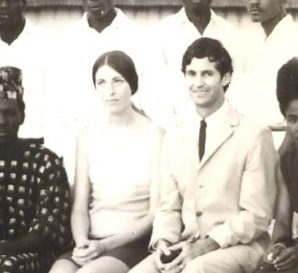|
Click here to send feedback on this website or suggestions of further links, documents, or reflections. |
|
Stanley R. Barrett
|
|
Obituary Tribute to alumnus |
|
Stanley R. Barrett's The Lamb and the Tiger: from Peacekeepers to Peacewarriors in Canada "Barrett has built up an enviable reputation as the foremost Canadian political anthropologist. The Lamb and the Tiger seeks to understand how Canada’s reputation as a major international peace-keeping power transitioned to one flexing its military muscle on the international scene...."
|
|
Stanley R. Barrett on
Academic Mobbing
|
|
(1) Feud, Vendetta and Mobbing (2) Médaka, Where Fate Stranded Me The two links above take you to (1) Stan Barrett's essay on academic mobbing and (2) his brief ethnography of a backward society wherein mobbing leads to social death. I am pleased to publish these two papers on this website with the the kind permission of his widow, Kaye Barrett. They have not been published before now. Stan asked me to read earlier versions of both these papers in 2005, explaining over coffee his intention to connect his anthropological research, especially his studies of feud and vendetta in Corsica and Albania, to the studies of workplace mobbing I had recently published. I responded with enthusiasm to his project, read the drafts with appreciation, and offered critical comments. Stan never mentioned these papers to me again, despite our being in touch from time to time, even as late as 2015 and 2016. For my part, I think I more or less forgot about the papers. Like many scholars, Stan and I both started more projects than we finished, and neither of us enjoyed being pestered about work in progress but not yet done. Only after Stan's death in 2021, did I learn from Kaye that he had indeed produced what he considered final versions of these two papers, that he had submitted each for journal publication in 2006, but that neither paper had been accepted without revision. Stan never got round to revising and resubmitting them. They were still languishing in his files when he died. It is these drafts from 2006, actually quite polished pieces of work, that are at long last published here. I have corrected a few typos, but otherwise left them exactly as he wrote them. Three distinctive qualities of Barrett's thoughts about mobbing recommend these papers for careful study by anyone interested in this momentous social process.
Appreciation I would leap at the chance to publish Barrett's papers on mobbing even if I had never laid eyes on the man. My own scholarly agenda this past quarter century has been to help build a coherent, illuminating body of knowledge about adult mobbing in workplaces. Barrett's papers are building blocks. Publishing the papers here is also, however, a tribute, an obeisance to a colleague whose scholarship I admired and whose friendship I treasured for fifty years. As new PhDs, we commenced positions at the University of Guelph the same year, 1970, and taught there in the same Department of Sociology/Anthropology until I moved away in 1972. Our scholarly interests diverged, but we shared commitment to social science, the use of logic, reason, and evidence to make sense of human relations. Stan had a terrific sense of humour, but he was dead serious about his vocation. The university was not for playing games. There was no cynicism in him. He was not an operator, schemer, or charlatan. Scholarship was for him a way of life. Stan was a product of 1960s Canada, the decade of this country's centennial, when the Maple Leaf flag was born, when Montreal Expo seemed to brighten the whole world, and when the Prime Minister was a Nobel Peace Prize laureate. It was a time of optimism, hope, idealism, confidence—and innocence. CUSO, Canadian University Students Overseas, embodied the zeitgeist. Founded in 1961, CUSO aimed to jumpstart social and economic development by sending bright young Canadian volunteers to work in poorer countries all around the world. Having finished his BA in 1963, Stan joined CUSO. He was among its first few hundred volunteers, teaching secondary school in the Igbo region of southeastern Nigeria. After returning to Canada for his MA and then commencing his PhD in the UK, Stan returned to Nigeria, this time with Kaye, as the decade drew to a close. They both taught in an Igbo high school. Stan did fieldwork for his doctoral thesis, subsequently published as Two Villages on Stilts: Economic and Family Change in Nigeria. The photo below shows them at the end of their stay in 1970, seated in the middle of about thirty Nigerian colleagues and students. The photo is a poignant symbol of a time that is past.
— Commentary by Kenneth Westhues |
|

